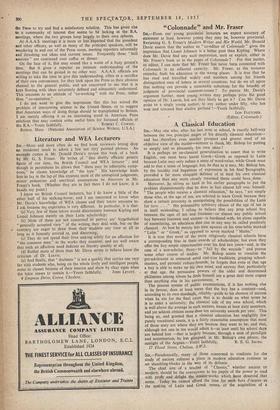Literature and WEA Lecturers
SIR, More and more often do we find book reviewers letting drop on incidental insult to adorn a few not very' pointed phrases. An ',sample comes in Mr. Donald Davie's review this week of a book by. Mr. G. S. Fraser. He writes of "that drably efficient generic figure of our time, the British Council and WEA lecturer" ; and though in parenthesis he allows that " there may be admirable excep- tions," he claims knowledge of " the type." His knowledge leads him to lay in the lap \of this creature most of the uninspired judgments, minor pedantries and uncritical assumptions he discovers in Mr. Fraser's book. (Whether they are in fact there 1 do not know; it is beside my point.)
I know no British Council lecturers, but I do know a little of the other half of his stalking-horse; and I am interested to know what Mr. Davie's knowledge of WEA classes and their tutors amounts to. I ask because my experience is very different. In particular, it is that: (a) Very few of these tutors would discriminate between Kipling and Lionel Johnson merely on their Latin scholarship; (b) Most of them are not concerned to purvey ant' hymathetical " generally accepted view " of the writing they deal with, but on the contrary are eager to draw from their students any view at all as long as it honestly arrived at, and discerning; (c) They do not spend their lives seeking solely for an affection for " the common man " in the works they examine, and are well aware that such an affection need indicate no literary quality at all; (d)' Rather more of them than Mr. Davie seems to believe know the criticism of Dr. Leavis; (e) And finally, that " drabness " is not a quality that carries one very far with students who, being on the whole lively and intelligent people, come to classes because of their interest and show by clear signs when
the tutor ceases to sustain it.—Yours faithfully, JOHN Lavin. . 4 Empress Drive, Crewe, Cheshire.


































 Previous page
Previous page